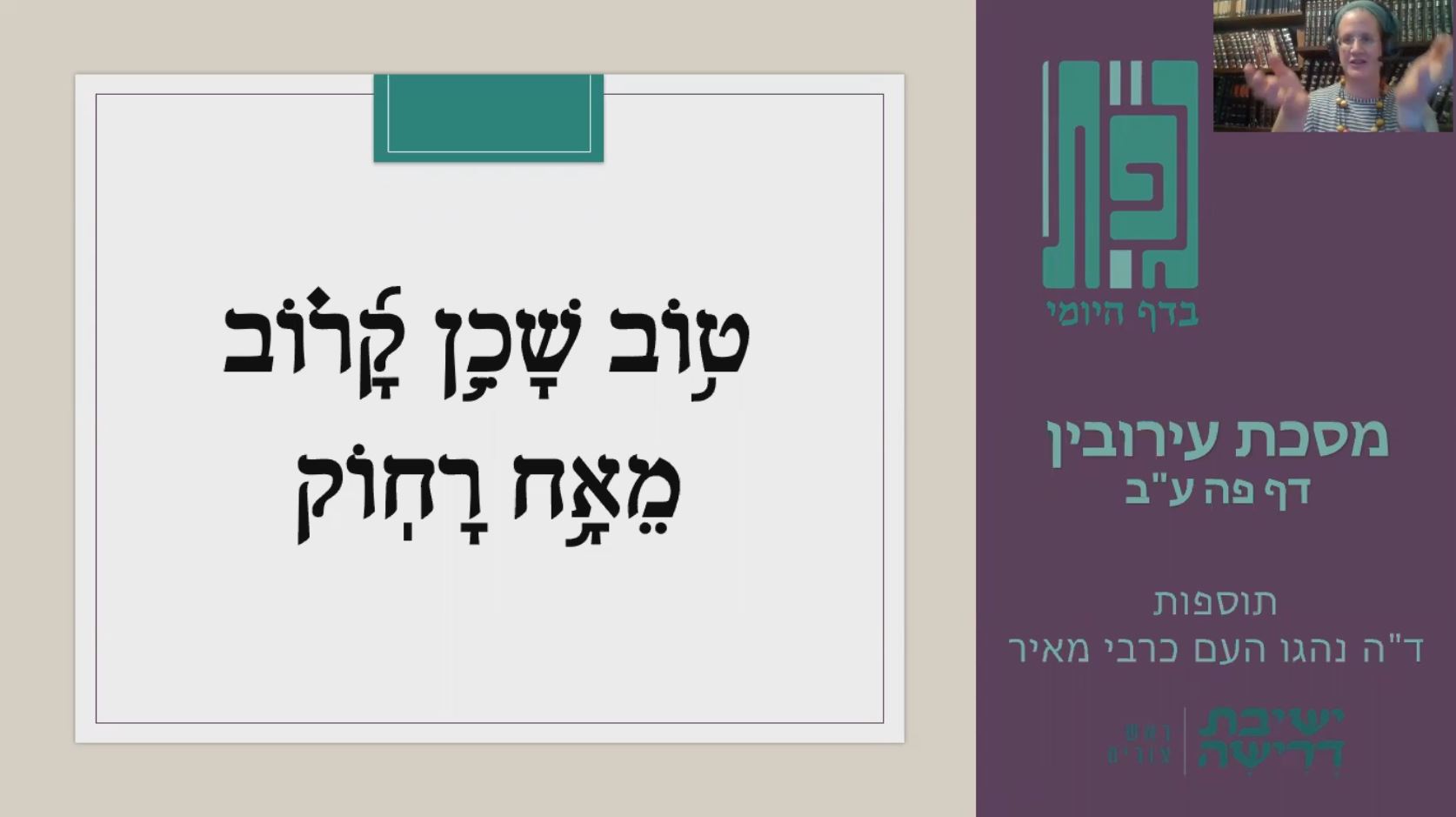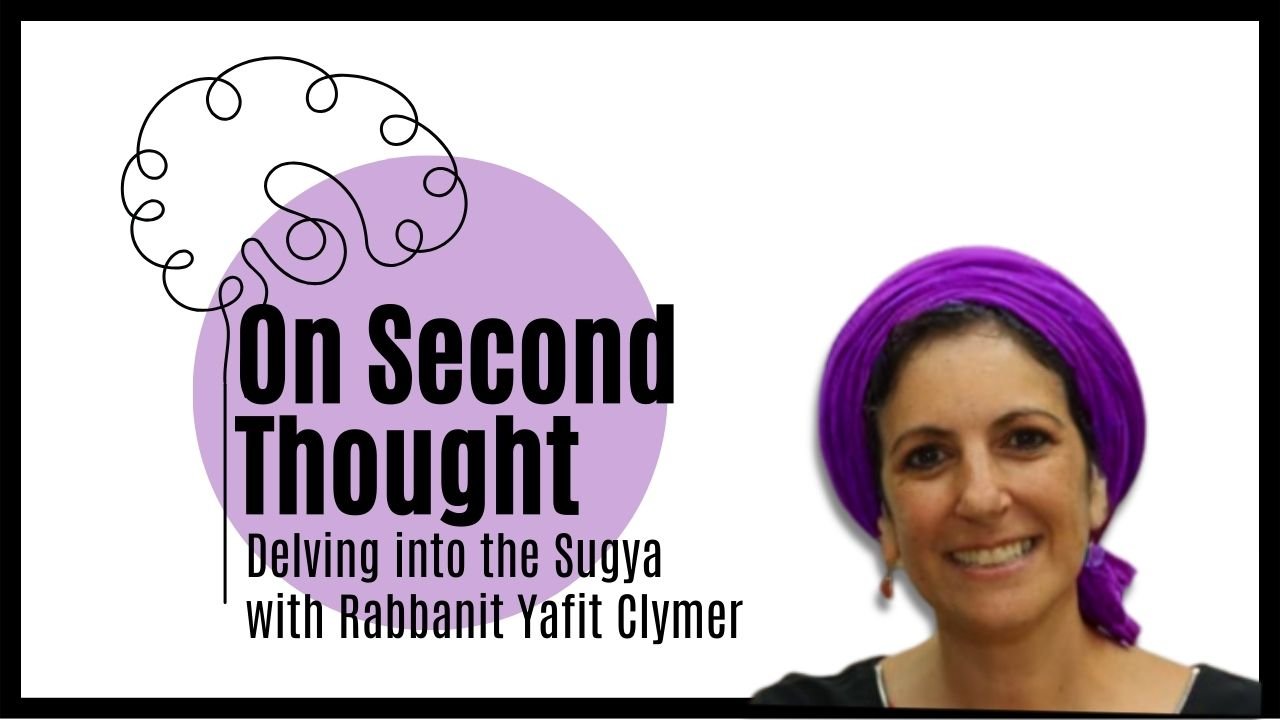כמה ימים צריך להכריז לפני שמוכרים נכסי יתומים כדי לשלם חוב? אבל אין מחזירים חובות מיתומים אז איך אפשר להסביר הלכה זו? הגמרא מביאה שלוש דעות שונות בקשר לגביית חובות מיתומים – האם אפשר ובאיזה נסיבות? אז הגמרא מביאה שלוש דעות למה אין נזקקים מנכסי יתומים.
רוצה להקדיש שיעור?
כלים
העמקה
רוצה להבין מה באמת קורה מתחת לפני השטח של הסוגיה?
שיעורים, פודקאסטים והרחבות של מיטב המורות שלנו יפתחו לך עוד זוויות וכיווני חשיבה.
חדשה בלימוד הגמרא?
זה הדף הראשון שלך? איזו התרגשות עצומה! יש לנו בדיוק את התכנים והכלים שיעזרו לך לעשות את הצעדים הראשונים ללמידה בקצב וברמה שלך, כך תוכלי להרגיש בנוח גם בתוך הסוגיות המורכבות ומאתגרות.
פסיפס הלומדות שלנו
גלי את קהילת הלומדות שלנו, מגוון נשים, רקעים וסיפורים. כולן חלק מתנועה ומסע מרגש ועוצמתי.
ערכין כב
תָּנוּ רַבָּנַן: שׁוּם הַיְּתוֹמִים שְׁלֹשִׁים יוֹם, וְשׁוּם הַהֶקְדֵּשׁ שִׁשִּׁים יוֹם, דִּבְרֵי רַבִּי מֵאִיר. רַבִּי יְהוּדָה אוֹמֵר: שׁוּם הַיְּתוֹמִים שִׁשִּׁים יוֹם, וְשׁוּם הַהֶקְדֵּשׁ תִּשְׁעִים יוֹם. וַחֲכָמִים אוֹמְרִים: אֶחָד זֶה וְאֶחָד זֶה שִׁשִּׁים יוֹם. אָמַר רַב חִסְדָּא אָמַר אֲבִימִי: הֲלָכָה שׁוּם הַיְּתוֹמִים שִׁשִּׁים יוֹם.
With regard to the duration of time for the proclamation, the Sages taught: One proclaims the appraisal of the property inherited by minor orphans for thirty days, and one proclaims the appraisal of consecrated property for sixty days. This is the statement of Rabbi Meir. Rabbi Yehuda says: One proclaims the appraisal of the property of orphans for sixty days, and one proclaims the appraisal of consecrated property for ninety days. And the Rabbis say: Both this and that are proclaimed for sixty days. Rav Ḥisda says that Avimi says: The halakha is that one proclaims the appraisal of the property of orphans for sixty days.
יָתֵיב רַבִּי חִיָּיא בַּר אָבִין וְקָאָמַר לְהָא שְׁמַעְתָּא. אֲמַר לֵיהּ רַב נַחְמָן בַּר יִצְחָק לְרַבִּי חִיָּיא בַּר אָבִין: שִׁשִּׁים קָאָמְרַתְּ אוֹ שְׁלֹשִׁים קָאָמְרַתְּ? אֲמַר לֵיהּ: שִׁשִּׁים. דִּיתוֹמִים אוֹ דְּהֶקְדֵּשׁ? אֲמַר לֵיהּ: דִּיתוֹמִים.
The Gemara relates that Rabbi Ḥiyya bar Avin was sitting and saying this halakha stated by Rav Ḥisda in the name of Avimi. Rav Naḥman bar Yitzḥak said to Rabbi Ḥiyya bar Avin: Did you say that the proclamation is for sixty days or did you say that it is for thirty days? Rabbi Ḥiyya bar Avin said to him: It is for sixty days. Rav Naḥman bar Yitzḥak continued: Is this the halakha with regard to the property of orphans or with regard to consecrated property? Rabbi Ḥiyya bar Avin said to him: It applies to the property of orphans.
כְּרַבִּי מֵאִיר אוֹ כְּרַבִּי יְהוּדָה? אֲמַר לֵיהּ: כְּרַבִּי מֵאִיר, וְהָא רַבִּי מֵאִיר שְׁלֹשִׁים קָאָמַר!
Rav Naḥman bar Yitzḥak persisted: Do you rule in accordance with the opinion of Rabbi Meir or in accordance with the opinion of Rabbi Yehuda? Rabbi Ḥiyya bar Avin said to him: I rule in accordance with the opinion of Rabbi Meir. Rav Naḥman bar Yitzḥak raised a difficulty: But Rabbi Meir says that the appraisal of the property of orphans is proclaimed for thirty days.
אֲמַר לֵיהּ: הָכִי אָמַר רַב חִסְדָּא: מֵאֲבִימִי קוּלְפֵי טָאבֵי בְּלַעִי עֲלַהּ דְּהָא שְׁמַעְתָּא, בָּא לְהַכְרִיז רְצוּפִים — שְׁלֹשִׁים.
Rabbi Ḥiyya bar Avin said to him that Rav Ḥisda said like this: I absorbed many blows [kulfei] from Avimi due to that halakha, i.e., Avimi would disparage me when I questioned his statement that according to Rabbi Meir one proclaims the appraisal of the property of orphans for sixty days, which is contradicted by the baraita. Avimi explained to Rav Ḥisda that if the court comes to proclaim the sale on consecutive days, then it is proclaimed for thirty days, in accordance with the baraita.
בְּשֵׁנִי וּבַחֲמִישִׁי, שִׁשִּׁים, וְאַף עַל גַּב דְּכִי חָשֵׁיב לְהוּ מָר לְיוֹמֵי הַכְרָזָה לָא הָווּ אֶלָּא תְּמָנֵיסַר יוֹמֵי, כֵּיוָן דְּמָשְׁכָא מִילְּתָא שָׁמְעִי אִינָשֵׁי.
But if it is proclaimed only on Monday and on Thursday, when the markets are open, villagers gather in the city, and the courts sit in judgment, then it is proclaimed over the course of sixty days. And even though if Master counts the number of days on which there is actually a proclamation, there are only eighteen days, far fewer than the thirty of the consecutive days, since the matter extends over the course of sixty days, people will hear about the sale.
אָמַר רַב יְהוּדָה אָמַר רַב אַסִּי: אֵין נִזְקָקִין לְנִכְסֵי יְתוֹמִים, אֶלָּא אִם כֵּן הָיְתָה רִבִּית אוֹכֶלֶת בָּהֶן. וְרַבִּי יוֹחָנָן אוֹמֵר: אוֹ לִשְׁטָר שֶׁיֵּשׁ בּוֹ רִבִּית, אוֹ לִכְתוּבַּת אִשָּׁה מִשּׁוּם מְזוֹנֵי.
§ Rav Yehuda says that Rav Asi says: The court attends to the property of minor orphans,to sell it in order to pay a debt, only if the debt was accruing interest that consumes the property of the orphans, since if they delay payment of the debt, it will grow dramatically. In other cases the court delays payment until the orphans reach majority. And Rabbi Yoḥanan says: The court attends to their property either to pay a debt recorded in a promissory note that contains interest or to pay a wife’s marriage contract, due to the standing obligation of the orphans to provide sustenance for their father’s widow from his estate as long as she has not received payment of her marriage contract. It is therefore beneficial to the orphans that she should collect her marriage contract immediately.
וְרַב אַסִּי מַאי טַעְמָא לָא אָמַר לִכְתוּבַּת אִשָּׁה? דְּהָא תַּקִּינוּ לֵיה רַבָּנַן מַעֲשֵׂה יָדֶיהָ, וְאִידַּךְ? זִימְנִין דְּלָא סָפְקָה.
The Gemara asks: And Rav Asi, what is the reason that he did not state that the court attends to their property for the purpose of paying the marriage contract of a wife? The Gemara responds: There is no financial loss to the orphans in such a case, because the Sages established for the late husband that as long as she receives sustenance from his estate, the orphans are entitled to her earnings. The Gemara asks: And the other, Rabbi Yoḥanan, in light of this fact why does he rule that the court attends to their property? The Gemara responds: Sometimes her earnings do not provide enough to reimburse the money spent on her sustenance.
תְּנַן: שׁוּם הַיְּתוֹמִים שְׁלֹשִׁים יוֹם, וְשׁוּם הַהֶקְדֵּשׁ שִׁשִּׁים יוֹם, וּמַכְרִיזִין בַּבֹּקֶר וּבָעֶרֶב. בְּמַאי עָסְקִינַן? אִילֵימָא בְּבַעַל חוֹב גּוֹי, מִי צָיֵית? אֶלָּא פְּשִׁיטָא בְּבַעַל חוֹב יִשְׂרָאֵל. אִי דְּקָאָכֵיל רִיבִּיתָא, מִי שָׁבְקִינַן לֵיהּ? וְאֶלָּא דְּלָא קָאָכֵיל רִיבִּיתָא, וְקָתָנֵי: נִזְקָקִין!
The Gemara continues: We learned in the mishna that one proclaims the appraisal of the property inherited by orphans for thirty days and the appraisal of consecrated property for sixty days, and one proclaims it in the morning and in the evening. The Gemara asks: What case are we dealing with in the mishna? If we say that we are dealing with a gentile creditor, will he comply with the ruling of the Jewish court that payment be delayed for thirty days? Rather, it is obvious that we are dealing with a Jewish creditor. Now, if the mishna is dealing with a situation where the interest consumes the orphans’ property, do we leave a Jew to collect interest? But rather, it must be referring to a case where the interest does not consume the orphans’ property, and nevertheless the mishna teaches that the court attends to the property of orphans even when no interest accrues on the loan. This apparently contradicts the opinions of Rav Asi and Rabbi Yoḥanan.
בִּשְׁלָמָא לְרַבִּי יוֹחָנָן, מוֹקֵי לַהּ בִּכְתוּבַּת אִשָּׁה, אֶלָּא לְרַב אַסִּי קַשְׁיָא. אָמַר לְךָ רַב אַסִּי: וּלְרַבִּי יוֹחָנָן מִי נִיחָא? מִי שָׁבְקִינַן מְזוֹנֵי דְּוַדַּאי קָא מַפְסְדָא, וְנָקְטִינַן הַכְרָזָה דְּלָא יָדְעִינַן אִי מַרְוְוחִינַן אִי לָא מַרְוְוחִינַן?
Granted, according to the opinion of Rabbi Yoḥanan the mishna is not difficult, as he can establish it as referring to payment of the marriage contract of a wife. But according to the opinion of Rav Asi, that the court does not attend to the property of orphans in such a case, the mishna poses a difficulty. The Gemara responds: Rav Asi could say to you: And according to the opinion of Rabbi Yoḥanan, does it work out well that the mishna requires thirty days of proclamation before the sale of the property? Do we leave aside the sustenance that the orphans certainly lose to the wife for the duration of the thirty days and take, i.e., implement, the proclamation, with regard to which we do not know if they will gain from it or if they will not gain, as it is uncertain that an offer matching the appraisal of the court will be made?
הָא לָא קַשְׁיָא, בְּתוֹבַעַת כְּתוּבָּתָהּ בְּבֵית דִּין, כִּדְרַב יְהוּדָה אָמַר שְׁמוּאֵל, דְּאָמַר רַב יְהוּדָה אָמַר שְׁמוּאֵל: הַתּוֹבַעַת כְּתוּבָּתָהּ בְּבֵית דִּין אֵין לָהּ מְזוֹנוֹת.
The Gemara rejects this argument: This is not difficult, as Rabbi Yoḥanan can explain that the mishna is referring to a widow who claims her marriage contract in court. And this is in accordance with a ruling that Rav Yehuda says that Shmuel says, as Rav Yehuda says that Shmuel says: A widow who claims payment of her marriage contract in court no longer receives sustenance from the estate of her husband.
אִי הָכִי, אִיזְדְּקוֹקֵי לָא מִיזְדַּקְקִינַן לַהּ, אֶלָּא כֵּיוָן דְּאִיזְדַּקְקִינַן לַהּ מֵעִיקָּרָא, מִיזְדַּקְקִינַן לַהּ לְבַסּוֹף.
The Gemara asks: If so, then we should not attend to her request to collect payment of her marriage contract at all. Rather, the court should delay payment until the orphans reach majority, as they incur no loss by delaying the payment. The Gemara rejects this suggestion: That is not appropriate; rather, since we attend to her initially, when she claims the payment of her marriage contract in court, we attend to her in the end as well, in order to collect payment from the orphans, despite the fact that the orphans will not lose money if they do not pay immediately.
מִכׇּל מָקוֹם, לְרַב אַסִּי קַשְׁיָא! לְעוֹלָם בְּבַעַל חוֹב גּוֹי, שֶׁקִּיבֵּל עָלָיו לָדוּן בְּדִינֵי יִשְׂרָאֵל.
The Gemara returns to its initial question: In any case, the mishna poses a difficulty for the opinion of Rav Asi, who maintains that the court attends to the property of orphans only in order to collect the payment of a loan that accrues interest, not for the payment of a marriage contract. If the mishna is dealing with a gentile creditor, he will not wait thirty days to collect payment, and if it is referring to a Jewish creditor, he is prohibited from charging interest in the first place. The Gemara responds: Actually, the mishna is referring to a gentile creditor, in the specific case of one who accepted upon himself to adjudicate in accordance with Jewish law. He therefore agrees to delay collection for thirty days.
אִי הָכִי, רִבִּית נָמֵי לָא לִישְׁקוֹל! שֶׁקִּיבֵּל עָלָיו לָזוֹ, וְלֹא קִיבֵּל עָלָיו לָזוֹ.
The Gemara asks: If so, let him also not take interest, as it is prohibited to do so according to Jewish law. The Gemara responds: The mishna is dealing with a case where he accepted Jewish law upon himself for this matter, to delay collection for thirty days, but he did not accept it upon himself for that matter, not to collect interest.
תָּא שְׁמַע: ״אֵין נִפְרָעִין מִנִּכְסֵי יְתוֹמִים אֶלָּא מִן הַזִּיבּוּרִית״. בְּמַאי עָסְקִינַן? אִילֵימָא בְּבַעַל חוֹב גּוֹי — מִי צָאֵית? אֶלָּא פְּשִׁיטָא בְּבַעַל חוֹב יִשְׂרָאֵל. אִי אָכֵיל רִיבִּיתָא — מִי שָׁבְקִינַן לֵיהּ? אֶלָּא דְּלָא אָכֵיל רִיבִּיתָא, וְקָתָנֵי: נִזְקָקִין!
The Gemara suggests: Come and hear a difficulty for the opinions of Rav Asi and Rav Yoḥanan from a mishna (Gittin 48b): A court can collect a father’s debt from the property of orphans only from land of the lowest quality. The Gemara asks: What are we dealing with in this mishna? If we say that the mishna is referring to a gentile creditor, will he comply and accept inferior-quality land as payment? Rather, it is obvious that we are dealing with a Jewish creditor. Now, if the mishna is referring to a case where the interest consumes the orphans’ property, do we leave him to collect interest? Rather, it must be dealing with a case where the interest does not consume the orphans’ property, and yet it is taught in the mishna that the court attends to the property of orphans even when no interest accrues on the loan.
בִּשְׁלָמָא לְרַבִּי יוֹחָנָן, מוֹקֵי לַהּ בִּכְתוּבַּת אִשָּׁה, אֶלָּא לְרַב אַסִּי קַשְׁיָא. אָמַר לְךָ רַב אַסִּי: וּלְרַבִּי יוֹחָנָן מִי נִיחָא? אִי כְּתוּבָּה, מַאי אִירְיָא מִיַּתְמֵי? אֲפִילּוּ מִינֵּיהּ דִּידֵיהּ נָמֵי בְּזִיבּוּרִית!
Once again, the Gemara states: Granted, the mishna is not difficult according to the opinion of Rabbi Yoḥanan, as he can establish it as referring to payment of the marriage contract of a wife. But according to the opinion of Rav Asi, that the court does not attend to the property of orphans in such a case, the mishna poses a difficulty. The Gemara responds that Rav Asi could say to you: And according to the opinion of Rabbi Yoḥanan, does the mishna work out well? If the mishna is referring to payment of a wife’s marriage contract, why does it discuss specifically a collection from orphans? Even in a case of a divorced woman who collects payment from the husband himself, she also receives only inferior-quality land.
הָא לָא קַשְׁיָא, רַבִּי מֵאִיר הִיא, דְּאָמַר: כְּתוּבַּת אִשָּׁה בְּבֵינוֹנִית, וּמִיַּתְמֵי בְּזִיבּוּרִית.
The Gemara answers: This is not difficult, as Rabbi Yoḥanan would reply that the mishna is in accordance with the opinion of Rabbi Meir, who says: A marriage contract of a wife is generally paid with intermediate–quality land, and if payment is collected from orphans, the marriage contract is paid with inferior-quality land.
מִכׇּל מָקוֹם, לְרַב אַסִּי קַשְׁיָא! לְעוֹלָם בְּבַעַל חוֹב גּוֹי, שֶׁקִּיבֵּל עָלָיו לָדוּן בְּדִינֵי יִשְׂרָאֵל. אִי הָכִי, רִבִּית נָמֵי לָא נִישְׁקוֹל! שֶׁקִּיבֵּל לְזוֹ, וְלֹא קִיבֵּל עָלָיו לָזוֹ.
The Gemara asks: In any case, the mishna poses a difficulty for the opinion of Rav Asi. The Gemara responds: Actually, the mishna is referring to a gentile creditor who accepted upon himself to adjudicate in accordance with Jewish law. He therefore agrees to accept payment from inferior-quality land. The Gemara asks: If so, let him also not take interest, which is prohibited according to Jewish law. The Gemara responds: The mishna is dealing with a case where he accepted Jewish law upon himself for this matter, to delay collection for thirty days, but he did not accept it upon himself for that matter, not to collect interest. The court therefore attends to the property of the orphans in order to minimize the interest owed to the creditor.
תָּא שְׁמַע: עַל מְנָת לִיתֵּן לָאִשָּׁה כְּתוּבָּתָהּ וּלְבַעַל חוֹב חוֹבוֹ. בִּשְׁלָמָא בַּעַל חוֹב, בֵּין מָר וּבֵין מָר — כִּדְשַׁנִּין.
The Gemara further suggests: Come and hear a difficulty from a baraita: When one proclaims the appraisal of the property of orphans, he announces that the property is being sold in order to give the proceeds to a wife as payment of her marriage contract or in order to give a creditor payment of his debt. The Gemara explains: Granted, there is no difficulty in the ruling that one proclaims that the property is being sold in order to give a creditor payment of a debt, as whether according to this Sage or whether according to that Sage, i.e., Rav Asi or Rabbi Yoḥanan, the mishna is in accordance with that which we taught above, that it is dealing with a gentile creditor who collects interest but agrees to delay payment.
אֶלָּא כְּתוּבָּתָהּ, בִּשְׁלָמָא לְרַבִּי יוֹחָנָן נִיחָא, אֶלָּא לְרַב אַסִּי קַשְׁיָא!
But with regard to the proclamation that the property is being sold in order to pay the wife’s marriage contract, granted, according to the opinion of Rabbi Yoḥanan, who maintains that the court attends to the property of orphans in such a case, the baraita works out well. But according to the opinion of Rav Asi, that the court does not attend to their property in order to pay a marriage contract, the baraita poses a difficulty.
הָכָא בְּמַאי עָסְקִינַן — כְּשֶׁחַיָּיב מוֹדֶה. הַשְׁתָּא דְּאָתֵית לְהָכִי, כּוּלְּהוּ נָמֵי כְּשֶׁחַיָּיב מוֹדֶה.
The Gemara responds: Here we are dealing with a case where the one who is obligated to pay admits that he has not yet paid, i.e., the father admitted before his death that he has not yet paid the obligation stated in the marriage contract. The Gemara notes: Now that you have arrived at this response, it is no longer necessary to establish that the previous cases are referring to a gentile creditor. Rather, all of them are also dealing with Jewish creditors, as they are referring to situations where the one who is obligated to pay admits that he has not yet paid. In such cases, the court collects payment from the property of the orphans without delay.
מָרִימָר אַגְבֵּי (כתובתה) [כְּתוּבָּה] לִגְרוּשָׁה מִנִּכְסֵי דְּיַתְמֵי. אֲמַר לֵיהּ רָבִינָא לְאַמֵּימָר: וְהָאָמַר רַב יְהוּדָה אָמַר רַב אַסִּי: ״אֵין נִזְקָקִין לְנִכְסֵי יְתוֹמִין אֶלָּא אִם כֵּן הָיְתָה רִבִּית אוֹכֶלֶת בָּהֶן״. רַבִּי יוֹחָנָן אוֹמֵר: אוֹ לִשְׁטָר שֶׁיֵּשׁ בּוֹ רִבִּית, אוֹ לִכְתוּבַּת אִשָּׁה מִשּׁוּם מְזוֹנֵי!
§ With regard to the dispute between Rav Asi and Rabbi Yoḥanan, the Gemara relates that Mareimar collected the payment of a marriage contract for a divorced woman from the property of minor orphans. Ravina said to Ameimar: But doesn’t Rav Yehuda say that Rav Asi says that the court does not attend to the property of minor orphans unless interest was consuming it, and Rabbi Yoḥanan says that the court attends to their property either to pay a debt recorded in a promissory note that contains interest or to pay a wife’s marriage contract, due to the obligation of the orphans to provide her sustenance.
וַאֲפִילּוּ רַבִּי יוֹחָנָן לָא קָאָמַר אֶלָּא בְּאַלְמָנָה, דְּקָמַפְסְדָא מְזוֹנֵי, אֲבָל גְּרוּשָׁה לָא!
Ravina added: And even Rabbi Yoḥanan says that they attend to the property of minor orphans only in the case of a widow, as she causes loss to their property due to the sustenance she receives until she collects payment of her marriage contract. But in the case of a divorced woman, who does not receive sustenance from their property, Rabbi Yoḥanan agrees that the court does not collect payment of her marriage contract until the orphans reach majority.
אֲמַר לֵיהּ: הָא אֲנַן דְּרַבִּי יוֹחָנָן מִשּׁוּם חִינָּא מַתְנִינַן לַהּ.
Ameimar said to Ravina: We learned that this statement of Rabbi Yoḥanan, that the court attends to the property of minor orphans in order to collect the payment of a marriage contract, is for the sake of favor, i.e., the court collects payment of a wife’s marriage contract not due to the sustenance that consumes the property of the orphans, but in order that the wife will find favor in the eyes of men so that they will marry her. This reason is equally applicable in the cases of a widow and a divorced woman.
אָמַר רַב נַחְמָן: מֵרֵישָׁא לָא הֲוָה מִיזְדְּקִיקְנָא לְנִכְסֵי יַתְמֵי, כֵּיוָן דִּשְׁמַעְנָא לְהָא דְּרַב הוּנָא חַבְרִין מִשְּׁמֵיהּ דְּרַב: ״יַתְמֵי דְּאָכְלִי דְּלָא דִּידְהוּ לֵיזְלוּ בָּתַר שִׁיבְקַיְיהוּ״, מִכָּאן וְאֵילָךְ מִיזְדְּקִקְנָא.
With regard to attending to the property of orphans, Rav Naḥman says: At first, I would not attend to the property of orphans in order to collect payment of a standard debt. Once I heard that which Rav Huna, our friend, said in the name of Rav: Orphans who consume that which is not theirs, let them follow their deceased parent to the graveyard, from that point forward I would attend to their property.
מֵעִיקָּרָא מַאי טַעְמָא לָא אָמַר רַב פָּפָּא: פְּרִיעַת בַּעַל חוֹב מִצְוָה, וְיַתְמֵי לָא בְּנֵי מֶיעְבַּד מִצְוָה נִינְהוּ. רַב הוּנָא בְּרֵיהּ דְּרַב יְהוֹשֻׁעַ אָמַר: אֵימַר צְרָרֵי אַתְפְּסֵיהּ.
The Gemara asks: At the outset, what is the reason that Rav Naḥman would not collect payment from minor orphans? Rav Pappa says: The repayment of a creditor is a mitzva, and minor orphans are not obligated in performing that mitzva. Rav Huna, son of Rav Yehoshua, said: The reason is that we say there is a concern that the father might have transferred bundles of coins to the creditor before his death as collateral and we are unaware of such a payment. Therefore, the court delays payment until the orphans reach majority in order to allow them time to clarify whether such payment was in fact made.
מַאי בֵּינַיְיהוּ? אִיכָּא בֵּינַיְיהוּ בְּשֶׁחַיָּיב מוֹדֶה, אִי נָמֵי שַׁמְּתוּהּ וּמִית בְּשַׁמְתֵּיהּ.
The Gemara asks: What is the practical difference between these two explanations? The Gemara responds: There is a practical difference between them in a case where the one who is obligated to pay admits that he still owes the money, or in a case where the court excommunicated the father in order to force him to pay and he died in a state of excommunication. In such instances, there is no doubt that the debt must be paid. According to Rav Pappa, even in such cases the court does not collect payment from minor orphans, as they are not obligated in the performance of the mitzva, whereas Rav Huna would rule that the court collects payment even before they reach majority, as there is no doubt that the debt is unpaid.
שְׁלַחוּ מִתָּם, דְּשַׁמְּתוּהּ וּמִית בְּשַׁמְתֵּיהּ, וְהִלְכְתָא כְּרַב הוּנָא בְּרֵיהּ דְּרַב יְהוֹשֻׁעַ.
The Gemara relates that they sent from there, Eretz Yisrael, a communication that all these cases cited above, in which the court collects payment of a debt from the property of minor orphans, are referring to situations where the court excommunicated the father and he died while under excommunication. And the halakha is in accordance with the opinion of Rav Huna, son of Rav Yehoshua.
תְּנַן: שׁוּם הַיְּתוֹמִים שְׁלֹשִׁים יוֹם, וְשׁוּם הַהֶקְדֵּשׁ שִׁשִּׁים יוֹם, וּמַכְרִיזִין בַּבֹּקֶר וּבָעֶרֶב. בְּמַאי עָסְקִינַן? אִילֵימָא בְּבַעַל חוֹב גּוֹי — מִי צָאֵית? אֶלָּא פְּשִׁיטָא בְּבַעַל חוֹב יִשְׂרָאֵל.
The Gemara attempts to determine the correct reason why the court does not attend to the property of minor orphans: We learned in the mishna that one proclaims the appraisal of the property of minor orphans that is being sold for thirty days, and one proclaims the appraisal of consecrated property for sixty days, and one proclaims it in the morning and in the evening. The Gemara asks: What are we dealing with here? If we say that the mishna is dealing with a gentile creditor who is unwilling to wait until the orphans reach majority, will he comply with the court’s directive that the appraisal of the property be proclaimed for thirty days before it is sold? Rather, it is obvious that the mishna is dealing with a Jewish creditor.
בִּשְׁלָמָא לְרַב הוּנָא בְּרֵיהּ דְּרַב יְהוֹשֻׁעַ, מוֹקֵי לַהּ בְּשֶׁחַיָּיב מוֹדֶה, אֶלָּא לְרַב פָּפָּא — קַשְׁיָא!
The Gemara concludes its proof: Granted, according to the opinion of Rav Huna, son of Rav Yehoshua, who says that the court does not attend to the property of minor orphans due to a concern that their father might have left bundles of coins with the creditor, he can establish the mishna as referring to a case where the one obligated to pay, i.e., the father, admits before his death that he has not paid. In such a case, the court does not wait to collect payment until the orphans reach majority. But according to the opinion of Rav Pappa, that the court does not attend to the property of minor orphans because they are not obligated in the mitzva to repay a loan, the mishna poses a difficulty.
אָמַר לְךָ רַב פָּפָּא: אִי בָּעֵית אֵימָא — כְּתוּבָּה מִשּׁוּם חִינָּא, וְאִי בָּעֵית אֵימָא — בְּבַעַל חוֹב גּוֹי שֶׁקִּיבֵּל עָלָיו לָדוּן בְּדִינֵי יִשְׂרָאֵל.
The Gemara explains that Rav Pappa could say to you: If you wish, say that the mishna is referring to a case where the court sells the property of the orphans in order to collect payment for a marriage contract, which the court does for the sake of favor, i.e., in order that the wife will own property and be desirable for marriage. And if you wish, say instead that the mishna is dealing with a gentile creditor who accepted upon himself to adjudicate in accordance with Jewish law. He therefore agrees to delay collection for thirty days.
אִי קִיבֵּל עָלָיו, לִינְטַר לְהוּ עַד דְּגָדְלִי! שֶׁקִּיבֵּל עָלָיו לָזוֹ, וְלֹא קִיבֵּל עָלָיו לָזוֹ.
The Gemara objects: If he accepted Jewish law upon himself, then let him wait for the orphans until they reach majority before demanding payment of the loan. The Gemara explains: The mishna is referring to a case where he accepted Jewish law upon himself for this matter, to delay collection for thirty days, but he did not accept it upon himself for that matter, to wait until they reach majority.
תָּא שְׁמַע: עַל מְנָת לִיתֵּן לָאִשָּׁה כְּתוּבָּתָהּ, וּלְבַעַל חוֹב חוֹבוֹ. בְּמַאי עָסְקִינַן? אִילֵימָא בְּבַעַל חוֹב גּוֹי — מִי צָיֵית? אֶלָּא פְּשִׁיטָא בְּבַעַל חוֹב יִשְׂרָאֵל.
The Gemara suggests: Come and hear a proof from a baraita: When one proclaims the appraisal of the property of orphans, he announces that the property is being sold in order to give the proceeds to a wife as payment of her marriage contract, or in order to give a creditor payment of his debt. The Gemara asks: What are we dealing with in the baraita? If we say that the baraita is referring to a gentile creditor who is unwilling to wait until the orphans reach majority, will he comply with the court’s directive that the appraisal of the property is proclaimed for thirty days before it is sold? Rather, it is obvious that the mishna is referring to a Jewish creditor.
בִּשְׁלָמָא לְרַב הוּנָא בְּרֵיהּ דְּרַב יְהוֹשֻׁעַ, מוֹקֵי לַהּ בְּשֶׁחַיָּיב מוֹדֶה. אֶלָּא לְרַב פָּפָּא, בִּשְׁלָמָא כְּתוּבָּה — מִשּׁוּם חִינָּא, אֶלָּא בַּעַל חוֹב קַשְׁיָא!
The Gemara continues: Granted, according to the opinion of Rav Huna, son of Rav Yehoshua, he can establish the mishna as referring to a case where the one obligated to pay admits before his death that he has not paid. But according to the opinion of Rav Pappa, granted, the court collects payment of a marriage contract for the sake of favor; but the fact that they sell the property in order to pay a creditor poses a difficulty.
לְעוֹלָם בְּבַעַל חוֹב גּוֹי, וּכְגוֹן שֶׁקִּיבֵּל עָלָיו לָדוּן בְּדִינֵי יִשְׂרָאֵל. אִי קִיבֵּל עָלָיו, לִינְטַר לְהוּ עַד דְּגָדְלִי! שֶׁקִּיבֵּל עָלָיו לָזוֹ, וְלֹא קִיבֵּל עָלָיו לָזוֹ.
The Gemara responds: Actually, the baraita is dealing with a gentile creditor, and is it referring to a case where he accepted upon himself to adjudicate in accordance with Jewish law. He therefore agrees to delay collection for thirty days. The Gemara objects: If he accepted Jewish law upon himself, then let him wait for the orphans until they reach majority before demanding payment of the loan. The Gemara again explains: The baraita is dealing with a case where he accepted Jewish law upon himself for this matter, to delay collection for thirty days, but he did not accept it upon himself for that matter, to wait until they reach majority.
רָבָא אָמַר: מִשּׁוּם שׁוֹבָר. אֲמַר לֵיהּ רַב הוּנָא בְּרֵיהּ דְּרַב יְהוֹשֻׁעַ לְרָבָא: וּמִי חָיְישִׁינַן לְשׁוֹבָר? וְהָתְנַן: הַנִּפְרַעַת שֶׁלֹּא בְּפָנָיו — לֹא תִּפָּרַע אֶלָּא בִּשְׁבוּעָה.
Rava says: The court does not collect payment from the property of minor orphans due to the concern that there might be a receipt, i.e., perhaps their father repaid the loan and received a receipt attesting to his payment and the orphans are unaware of its existence. Rav Huna, son of Rav Yehoshua, said to Rava: But are we concerned for the existence of a receipt? Didn’t we learn in a mishna (Ketubot 87a): A woman who collects the payment of her marriage contract from the property of her husband when not in his presence, e.g., if her husband is overseas, may collect only by means of an oath that she has not yet received payment.
וְאָמַר רַבִּי אַחָא שַׂר הַבִּירָה: מַעֲשֶׂה בָּא לִפְנֵי רַבִּי יִצְחָק נַפָּחָא לְאַנְטוֹכְיָא, וְאָמַר: לֹא שָׁנוּ אֶלָּא כְּתוּבַּת אִשָּׁה מִשּׁוּם חִינָּא, אֲבָל בַּעַל חוֹב — לָא, וְרַבָּה אָמַר רַב נַחְמָן: אֲפִילּוּ בַּעַל חוֹב נָמֵי,
And Rabbi Aḥa Sar HaBira says: An incident came before Rabbi Yitzḥak Nappaḥa in Antioch, and he issued a ruling and said: They taught this halakha, that she may collect the payment of her marriage contract in her husband’s absence, only with regard to the wife’s marriage contract, for the sake of favor. But a creditor does not have the right to collect the debt that is owed to him in the debtor’s absence. And Rabba says that Rav Naḥman says: Even a creditor may collect a payment by means of an oath in the debtor’s absence.
וְאִי חָיְישַׁתְּ לְשׁוֹבָר — הָתָם נָמֵי נֵיחוּשׁ! אֲמַר לֵיהּ: הָתָם, כִּדְאָמְרִינַן טַעְמָא, שֶׁלֹּא יְהֵא כׇּל אֶחָד נוֹטֵל מְעוֹתָיו שֶׁל חֲבֵירוֹ וְהוֹלֵךְ וְיוֹשֵׁב לוֹ בִּמְדִינַת הַיָּם.
Rav Huna explains the difficulty: And if you are concerned for the existence of a receipt, then in that case there as well, where the obligated party is overseas, let us be concerned that he has in fact paid the debt and received a receipt. Rava said to him: In that case there, one is not concerned about the existence of a receipt, in accordance with the reason that we say: It is in order that there should not be a situation where every person will take the money of another and go and reside in a country overseas, to prevent the creditor from collecting the money from his property.
אָמַר רָבָא, הִלְכְתָא: אֵין נִזְקָקִין לְנִכְסֵי יְתוֹמִין, וְאִם אָמַר: ״תְּנוּ״ — נִזְקָקִין. ״שָׂדֶה זוֹ״ וּ״מָנֶה זוֹ״ — נִזְקָקִין וְאֵין מַעֲמִידִין אַפּוֹטְרוֹפּוֹס, ״שָׂדֶה״ סְתָם וּ״מָנֶה״ סְתָם — נִזְקָקִין וּמַעֲמִידִין אַפּוֹטְרוֹפּוֹס.
§ Rava says: The halakha is that the court does not attend to the property of minor orphans in order to pay the debts owed by their father. But if their father said before his death: Give so-and-so the payment of my debt, the court attends to their property. Specifically, if the father said: Give this field to so-and-so, or: Give this one hundred dinars to so-and-so, then the court attends to their property to collect payment, and the court does not install a steward [apotropos] to negotiate with the creditor on their behalf. If he said: Give a field to so-and-so, i.e., an unspecified field, or: Give one hundred dinars to so-and-so, i.e., unspecified dinars, then the court attends to the property of the orphans and they install a steward to act on their behalf, to ensure that the best fields remain in their possession.
אָמְרִי נְהַרְדָּעֵי: בְּכוּלְּהוּ נִזְקָקִין וּמַעֲמִידִין אַפּוֹטְרוֹפּוֹס, לְבַד מִנִּמְצֵאת שָׂדֶה שֶׁאֵינָהּ שֶׁלּוֹ, דְּאַחְזוֹקֵי סָהֲדֵי בְּשַׁקָּרֵי לָא מַחְזְקִינַן.
By contrast, the Sages of Neharde’a say: In all of these cases where the father told his children before his death to give an item, the court attends to the property of the orphans and they install a steward to act on their behalf, except for a situation where a field is found in their possession with regard to which witnesses have testified that it is not their father’s, but is in fact stolen. In such a case, the stolen field is seized and returned to its owner without recourse to a steward, as we do not presume that witnesses are liars.
אָמַר רַב אָשֵׁי: הִלְכָּךְ אִזְדְּקוֹקֵי לָא מִזְדַּקְקִינַן, דְּהָא אָמַר רָבָא: הִלְכְתָא אֵין נִזְקָקִין, וְאִי מִזְדַּקְקִינַן מוֹקְמִינַן אַפּוֹטְרוֹפּוֹס, דְּאָמְרִי נְהַרְדָּעֵי: בְּכוּלְּהוּ נִזְקָקִין וּמַעֲמִידִין אַפּוֹטְרוֹפּוֹס, לְבַד מִנִּמְצֵאת שָׂדֶה שֶׁאֵינָהּ שֶׁלּוֹ, דְּאַחְזוֹקֵי סָהֲדֵי בְּשַׁקָּרֵי לָא מַחְזְקִינַן.
Rav Ashi says: Therefore, we do not attend to the property of minor orphans in order to repay a standard loan, as Rava says: The halakha is that the court does not attend to their property. And if we attend to their property, e.g., in a case where the father told his children to repay the debt, we install a steward to act on behalf of the orphans, as the Sages of Neharde’a say: In all of the cases, the court attends to the property of minor orphans and installs a steward, except for a situation where a field is found in their possession that is not the father’s, as we do not presume that witnesses are liars.



































